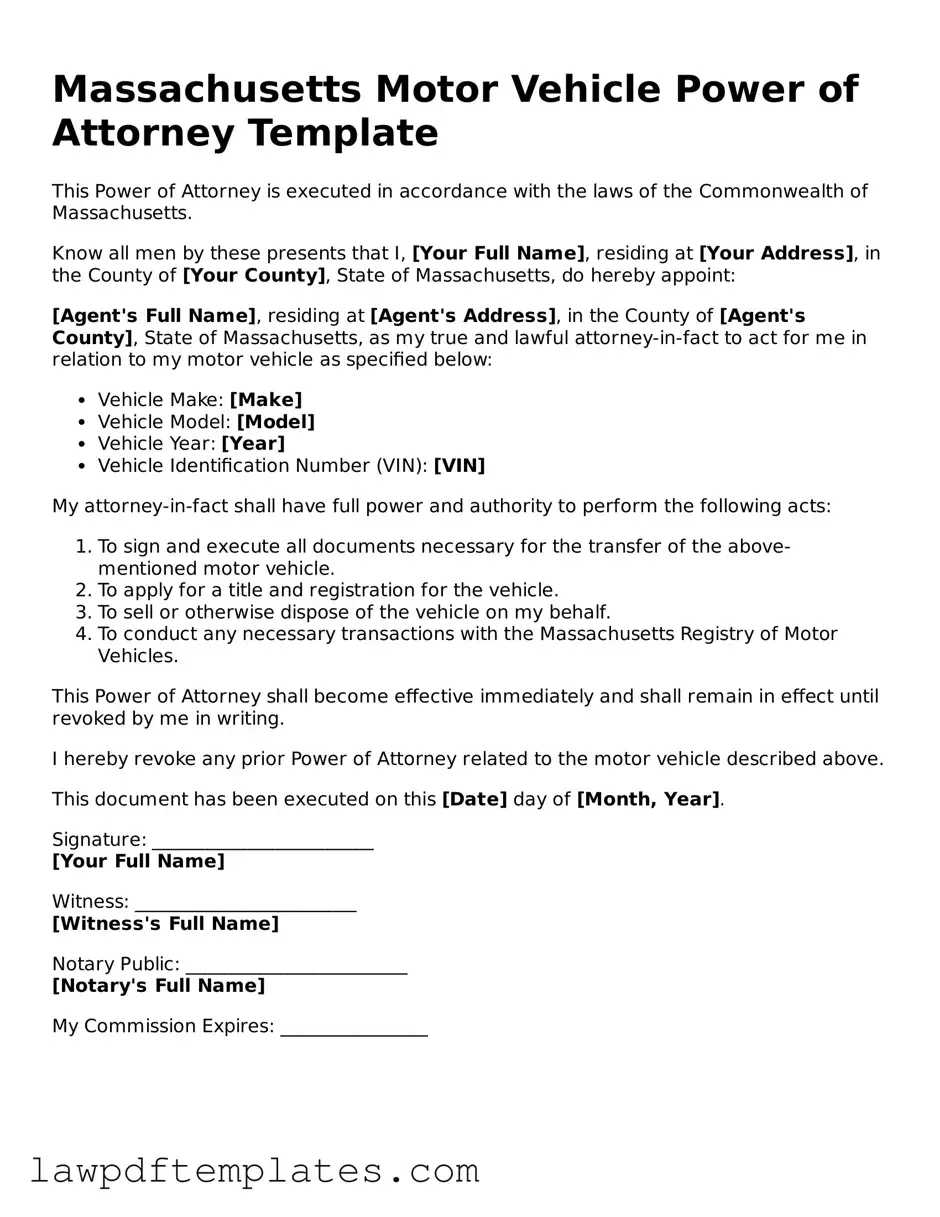Free Motor Vehicle Power of Attorney Template for the State of Massachusetts
Form Breakdown
| Fact Name | Description |
|---|---|
| Purpose | The Massachusetts Motor Vehicle Power of Attorney form allows an individual to designate another person to handle motor vehicle transactions on their behalf. |
| Governing Law | This form is governed by Massachusetts General Laws, Chapter 190B, Article V, which pertains to powers of attorney. |
| Signatures Required | The form must be signed by the principal (the person granting the power) and may require notarization for validity. |
| Scope of Authority | The designated agent can perform various tasks, such as transferring title, registering vehicles, and handling related paperwork. |
| Duration | The power of attorney remains effective until revoked or until the principal's death, unless a specific expiration date is indicated. |
| Revocation | The principal can revoke the power of attorney at any time, provided that the revocation is communicated to the agent and any relevant parties. |
| Agent's Responsibilities | The agent must act in the best interests of the principal and adhere to the powers granted in the form. |
| Usage | This form is commonly used for transactions involving the sale, purchase, or registration of motor vehicles in Massachusetts. |
Sample - Massachusetts Motor Vehicle Power of Attorney Form
Massachusetts Motor Vehicle Power of Attorney Template
This Power of Attorney is executed in accordance with the laws of the Commonwealth of Massachusetts.
Know all men by these presents that I, [Your Full Name], residing at [Your Address], in the County of [Your County], State of Massachusetts, do hereby appoint:
[Agent's Full Name], residing at [Agent's Address], in the County of [Agent's County], State of Massachusetts, as my true and lawful attorney-in-fact to act for me in relation to my motor vehicle as specified below:
- Vehicle Make: [Make]
- Vehicle Model: [Model]
- Vehicle Year: [Year]
- Vehicle Identification Number (VIN): [VIN]
My attorney-in-fact shall have full power and authority to perform the following acts:
- To sign and execute all documents necessary for the transfer of the above-mentioned motor vehicle.
- To apply for a title and registration for the vehicle.
- To sell or otherwise dispose of the vehicle on my behalf.
- To conduct any necessary transactions with the Massachusetts Registry of Motor Vehicles.
This Power of Attorney shall become effective immediately and shall remain in effect until revoked by me in writing.
I hereby revoke any prior Power of Attorney related to the motor vehicle described above.
This document has been executed on this [Date] day of [Month, Year].
Signature: ________________________
[Your Full Name]
Witness: ________________________
[Witness's Full Name]
Notary Public: ________________________
[Notary's Full Name]
My Commission Expires: ________________
Common mistakes
Filling out the Massachusetts Motor Vehicle Power of Attorney form can be straightforward, but there are common mistakes that people often make. These errors can lead to delays or complications in the process. Understanding these pitfalls can help ensure that the form is completed correctly.
One frequent mistake is not providing the correct names of the parties involved. The form requires the full legal names of both the principal and the agent. Omitting middle names or using nicknames can create confusion and may invalidate the document. Always double-check that names match official identification.
Another common error is failing to specify the powers granted. The form allows for a range of authorities, such as transferring ownership or registering a vehicle. If the powers are not clearly outlined, the agent may not have the authority needed to act on behalf of the principal. Be precise about what the agent can and cannot do.
People also often overlook the need for signatures. Both the principal and the agent must sign the form for it to be valid. In some cases, individuals forget to sign or assume that a verbal agreement suffices. Remember, signatures are essential for legal recognition.
Inaccurate dates can also pose a problem. The date of signing should be included on the form, and it must be current. Using an old date or leaving this section blank can lead to questions about the validity of the document.
Another mistake involves not having the form notarized when required. While not all situations necessitate notarization, certain transactions may require it to ensure authenticity. Check the specific requirements for your situation to avoid any issues.
Finally, failing to provide copies of the completed form can lead to complications. After the form is filled out, it’s important to keep copies for both the principal and the agent. This ensures that everyone has access to the same information and can refer back to the document as needed.
By being aware of these common mistakes, individuals can complete the Massachusetts Motor Vehicle Power of Attorney form more effectively. Attention to detail is key to ensuring that the document serves its intended purpose without unnecessary delays.
Discover More Motor Vehicle Power of Attorney Templates for Specific States
How to Get Power of Attorney to Sell a Car - Empowers another individual to make decisions regarding a vehicle's license plate.
Understanding the intricacies of a Real Estate Purchase Agreement is crucial for both buyers and sellers in Texas, as it helps prevent misunderstandings throughout the transaction process; for those looking for a reliable source to access this important document, you can visit PDF Documents Hub to ensure you have the correct forms in hand.
Title Transfer Nj - Protect your vehicle transactions by ensuring there’s someone capable to act on your behalf.
Illinois Dmv Power of Attorney - A Power of Attorney ensures your vehicle needs are met promptly when you’re away.
How to Get Power of Attorney Florida - Authorize a trusted person to verify, sign, and submit vehicle documents on your behalf.
